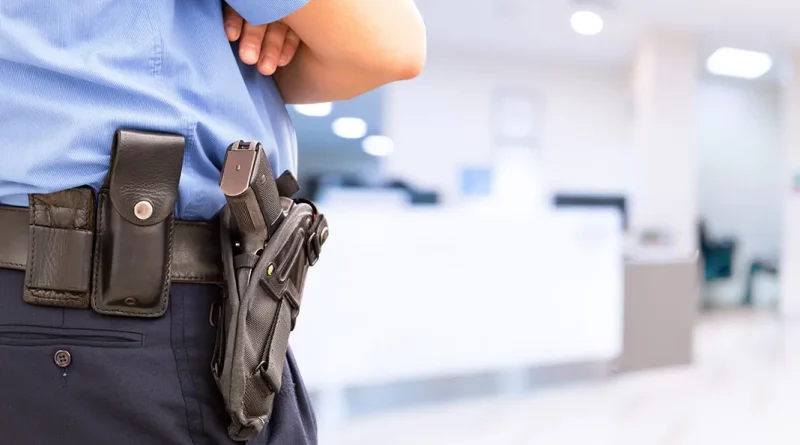we will explore the benefits of having armed security at hospitals.
General
Benefits of Having Armed Security at Hospitals
The safety and security of patients, staff, and visitors is a top priority for hospitals. With the increasing incidents of violence and crime in society, hospitals have become more vulnerable to security threats. One of the ways to ensure safety is to have armed security at hospitals. Here, we will explore the benefits of having armed security at hospitals.
- Deterrence of Crime
Armed security at hospitals serves as a visible deterrent to potential criminals. The presence of armed guards sends a message that the hospital takes security seriously and is prepared to take necessary measures to protect its staff and patients. The mere sight of armed security can discourage criminals from attempting to commit a crime at the hospital.
- Quick Response to Emergencies
In the event of an emergency, armed security personnel can respond quickly and effectively. They are trained to handle a range of security threats, including violent incidents, medical emergencies, and other security issues. Having armed security on-site can help minimize the response time and prevent the situation from escalating.
- Protection of Patients and Staff
Armed security personnel can provide protection for patients and staff in case of a security threat. They can escort patients and staff to safety, lock down the facility, and prevent unauthorized access to sensitive areas. In the event of an active shooter situation or other violent incident, armed security can intervene and neutralize the threat.
- Prevention of Theft and Vandalism
Hospitals are susceptible to theft and vandalism, which can result in significant financial losses. Having armed security at hospitals can help prevent theft and vandalism by monitoring high-risk areas and deterring potential criminals. Armed guards with latest guns and 12 gauge ammo can also conduct regular patrols of the hospital to ensure that everything is secure.
- Improved Safety for Visitors
Visitors to hospitals are often vulnerable, and their safety must be a top priority. Armed security personnel can provide a safe environment for visitors by monitoring the premises, checking credentials, and providing escorts to parking lots and other areas. This can help prevent incidents such as theft, assault, or harassment.
- Safe Transfer of Patients
Armed security can ensure the safe transfer of patients from one area of the hospital to another. This can include transferring high-risk patients, such as those with mental health issues or criminal backgrounds, to different parts of the hospital. Armed security can also assist with the transport of medications, medical equipment, and other critical supplies.
- Protection of Hospital Property
Hospitals have valuable property, including medical equipment, pharmaceuticals, and confidential patient information. Armed security can help protect these assets by monitoring access to sensitive areas, conducting regular patrols, and responding quickly to security breaches.
- Enhanced Staff Morale
The presence of armed security at hospitals can boost staff morale and create a sense of security. Staff members can focus on their jobs without worrying about their safety or the safety of their patients. This can improve job satisfaction and reduce staff turnover, which can ultimately benefit patient care.
- Compliance with Regulatory Standards
Many healthcare regulatory agencies require hospitals to have security measures in place to ensure the safety of patients, staff, and visitors. Having armed security at hospitals can help ensure compliance with these regulations and avoid potential fines or legal penalties.
Conclusion:
when evaluating security measures for hospitals.
when evaluating security measures for hospitals.
when evaluating security measures for hospitals.
when evaluating security measures for hospitals.
when evaluating security measures for hospitals.
when evaluating security measures for hospitals.
when evaluating security measures for hospitals.
when evaluating security measures for hospitals.
when evaluating security measures for hospitals.
when evaluating security measures for hospitals.
when evaluating security measures for hospitals.
when evaluating security measures for hospitals.
when evaluating security measures for hospitals.
when evaluating security measures for hospitals.
when evaluating security measures for hospitals.
when evaluating security measures for hospitals.
when evaluating security measures for hospitals.
when evaluating security measures for hospitals.
when evaluating security measures for hospitals.
when evaluating security measures for hospitals.
when evaluating security measures for hospitals.
when evaluating security measures for hospitals.
when evaluating security measures for hospitals.
when evaluating security measures for hospitals.
when evaluating security measures for hospitals.
when evaluating security measures for hospitals.
when evaluating security measures for hospitals.
when evaluating security measures for hospitals.
when evaluating security measures for hospitals.
when evaluating security measures for hospitals.
when evaluating security measures for hospitals.
when evaluating security measures for hospitals.
when evaluating security measures for hospitals.
when evaluating security measures for hospitals.
when evaluating security measures for hospitals.
when evaluating security measures for hospitals.
In conclusion, having armed security at hospitals can provide a range of benefits, including deterrence of crime, quick response to emergencies, protection of patients and staff, prevention of theft and vandalism, improved safety for visitors, safe transfer of patients, protection of hospital property, enhanced staff morale, and compliance with regulatory standards. While the decision to have armed security at hospitals is a complex one, these benefits should be considered when evaluating security measures for hospitals.




Post a Comment